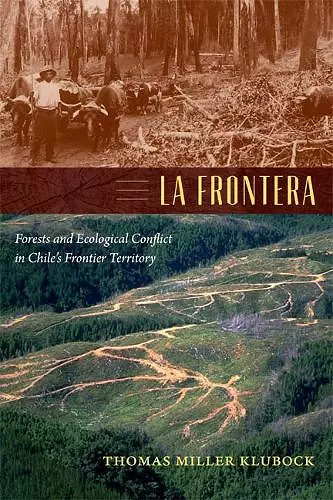La Frontera
Forests and Ecological Conflict in Chile’s Frontier Territory
Format:Hardback
Publisher:Duke University Press
Published:18th Apr '14
Currently unavailable, and unfortunately no date known when it will be back

In La Frontera, Thomas Miller Klubock offers a pioneering social and environmental history of southern Chile, exploring the origins of today’s forestry "miracle" in Chile. Although Chile's forestry boom is often attributed to the free-market policies of the Pinochet dictatorship, La Frontera shows that forestry development began in the early twentieth century when Chilean governments turned to forestry science and plantations of the North American Monterey pine to establish their governance of the frontier's natural and social worlds. Klubock demonstrates that modern conservationist policies and scientific forestry drove the enclosure of frontier commons occupied by indigenous and non-indigenous peasants who were defined as a threat to both native forests and tree plantations. La Frontera narrates the century-long struggles among peasants, Mapuche indigenous communities, large landowners, and the state over access to forest commons in the frontier territory. It traces the shifting social meanings of environmentalism by showing how, during the 1990s, rural laborers and Mapuches, once vilified by conservationists and foresters, drew on the language of modern environmentalism to critique the social dislocations produced by Chile's much vaunted neoliberal economic model, linking a more just social order to the biodiversity of native forests.
"La Frontera: Forests and Ecological Conflict in Chile's Frontier Territory tells the compelling backstory to Chile's forestry boom. Indigenous people, settlers and foresters were pushed out through enclosure and fraud, as temperate rainforest was burned to make way first for agriculture, then sterile plantations of Monterey pine." -- Patience Schell * Times Higher Education *
"A much-needed analysis of a region the history of which has been understudied." -- Claudio Robles-Ortiz * Journal of Agrarian Change *
“La Frontera brings a great deal to the table; individual chapters provide enough fodder for a week’s seminar meeting. Undergraduates might feel overwhelmed, but as that list of themes indicates, they will find in the book many crucial features of the long twentieth century in Latin America as a whole.With Klubock’s telling, we have new ways to understand how Chile experienced those processes.” -- Thomas D. Rogers * Hispanic American Historical Review *
“La Frontera makes its social subjects come alive. It convincingly shows that the debate over the forest has a long history and that we cannot understand forest policy without taking social history into account. This is political ecology at its best.” -- Eduardo Silva * European Review of Latin American and Caribbean Studies *
"Klubock’s source base for this nuanced and detailed monograph includes diverse archival materials, many of which had not previously been used by historians, as well as oral histories of forestry workers, labour activists and indigenous communities. ... This is an excellent study, addressing an extremely complex history, to which a review of this length cannot do justice. La Frontera pioneers a new approach to social and environmental history and will be a reference in point for years to come." -- Patience A. Schell * Journal of Latin American Studies *
"This exceptional book is a rare combination of the best traditions of social history and environmental history in a powerful analysis of Chile’s forestry sector from the late nineteenth century to the present.... Readers interested in the contemporary environmentalist challenge of Mapuche movements today will find La Frontera indispensable. Historians interested in Latin America’s experience of 'enclosing of the commons' will find no better book." -- Heidi Tinsman * The Historian *
"Insightful and necessary." -- Emily Wakild * Canadian Journal of History *
ISBN: 9780822355984
Dimensions: unknown
Weight: 658g
416 pages